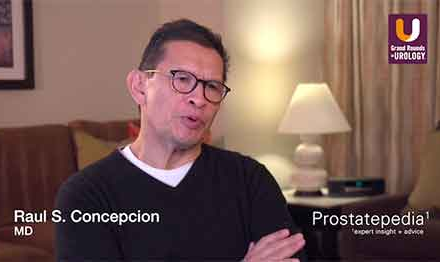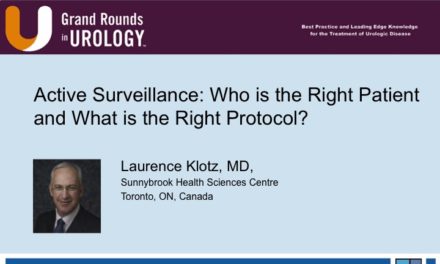Gerald L. Andriole, Jr., MD, presented “Considerations to Improve Screening for Prostate Cancer” for the Grand Rounds in Urology audience in December 2021.
How to cite: Andriole, Gerald L. “Considerations to Improve Screening for Prostate Cancer.” December 2021. Accessed Oct 2025. https://grandroundsinurology.com/considerations-to-improve-screening-for-prostate-cancer/
Considerations to Improve Screening for Prostate Cancer
Gerald L. Andriole, Jr., MD, outgoing Robert K. Royce Distinguished Professor and Chief of Urologic Surgery at Barnes-Jewish Hospital, the Siteman Cancer Center, and Washington University School of Medicine in St. Louis, Missouri, and incoming Director of Urology in the National Capital Region at the Brady Urologic Institute at Johns Hopkins University, reviews current guidelines for prostate cancer screening and considers how screening can be improved. After an introduction from E. David Crawford, Editor-in-Chief of Grand Rounds in Urology and Professor of Urology at the University of California, San Diego, Dr. Andriole summarizes the AUA, EAU, and NCCN prostate cancer screening guidelines, highlighting the NCCN’s recommendation that men get an early-in-life PSA test to obtain a baseline, and interrogating the validity of the age cut-offs for testing in the AUA and EAU guidelines. He then proposes a series of concepts to improve screening, starting with recommendations on how to better identify which men are at above average risk. Dr. Andriole particularly emphasizes the utility of polygenomic risk scores, which have a high negative predictive value and can focus attention on which patients need to be further screened. He suggests that another key way to improve screening is to reduce confusion about the PSA test among patients and primary care providers by setting a cut-point of 1-1.5 as a threshold for referral to a urologist. Dr. Andriole then considers how to identify patients with clinically-significant prostate cancer earlier, focusing on the need for better biopsies. He also notes the importance of reducing unnecessary repeat and initial biopsies and suggests potentially using biomarkers, MRI, and PSMA-PET to decide whether a biopsy is necessary. After concluding his talk, Dr. Andriole further discusses polygenic risk score, the pros and cons of multiparametric MRI, the benefits of micro-ultrasound, transrectal versus transperineal biopsy, and the future of screening with Dr. Crawford.
ABOUT THE AUTHOR
Gerald L. Andriole, Jr., MD, is the global Chief Medical Officer at Prostatype Genomics. He previously was Professor and Director of Urology in the National Capital Region at the Brady Urologic Institute at Johns Hopkins University. He also formerly served as the Robert K. Royce Distinguished Professor and Chief of Urologic Surgery at Barnes-Jewish Hospital, the Siteman Cancer Center, and Washington University School of Medicine in St. Louis, Missouri.
Dr. Andriole received his medical degree from Jefferson Medical College in Philadelphia, Pennsylvania. He trained in surgery at Strong Memorial Hospital and the University of Rochester, and completed his Urology Residency at Brigham and Women’s Hospital and Harvard Medical School. Subsequently, he was a Fellow in Urologic Oncology at the National Cancer Institute in Bethesda, Maryland. Dr. Andriole has over 40 years of consistent contributions in the areas of prostate cancer screening and prevention research as well as BPH. He has contributed to over 450 peer-reviewed publications. He chaired the Prostate Committee of NCI’s PLCO Cancer Screening Trial, the Steering Committee of the international REDUCE International Prostate Cancer Prevention Trial and the Prostate Committee of the SUO Clinical Trials Consortium. He is a member of the American Urological Association, the Academy of Master Surgical Educators of the American College of Surgeons, the American Surgical Association, the American Association of Genitourinary Surgeons, and the Clinical Society of Genitourinary Surgeons, among other societies.
He has received the Outstanding Achievement Award from the Urologic Oncology Branch of NCI, the Distinguished Clinician Award from Washington University, the Alumni Award from Jefferson Medical College, and the Williams Award for Prostate Cancer Research Excellence from the AUA Urology Care Foundation, among others.





